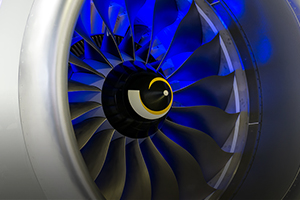Quiet, More Efficient Jet Engine
 Advances in material engineering continue to impact our daily lives in ways we may not even notice. For example, thanks to a new titanium aluminide alloy with twice the strength of conventional cast alloys, aircraft engines will soon become quieter and more environmentally friendly than ever before. A new design known as a geared turbofan and branded by Pratt & Whitney as “PurePower” is scheduled to be rolled out in the coming year as an option on the A320neo from Airbus, Europe’s largest aerospace producer.
Advances in material engineering continue to impact our daily lives in ways we may not even notice. For example, thanks to a new titanium aluminide alloy with twice the strength of conventional cast alloys, aircraft engines will soon become quieter and more environmentally friendly than ever before. A new design known as a geared turbofan and branded by Pratt & Whitney as “PurePower” is scheduled to be rolled out in the coming year as an option on the A320neo from Airbus, Europe’s largest aerospace producer.
Geared turbofans represent a third generation of jet engine design. Starting with turbojets, aircraft engines are basically designed to channel incoming air into a compressor where it is mixed with fuel and ignited to create thrust. Turbofans were added to direct a portion of the air around, rather than through, the compressor core, creating additional thrust while making the system quieter and more efficient. But as the fans have increased in size and their tips are traveling at rates approaching the speed of sound, further acceleration could result in shock waves and potentially dangerous vibrations.
The addition of a gearbox allows the fan blades to travel at a slower speed while allowing other parts of the engine to operate at optimal performance levels and direct an even greater volume of air around the core to produce more thrust. The result is a reduction in fuel consumption of 15 percent on the A320 – an annual savings of $1.5 million in fuel costs per aircraft. The only downside appears to be that the geared turbofan requires a longer cool down period between restarts, which could become an issue at busy airports.
It has been reported that about one-third of the 4,400 A320neos currently on order will be equipped with PurePower engines.
For information: Pratt & Whitney, A United Technologies Company, 400 Main Street, East Hartford, CT 06118; phone: 860-565-4321; Web site: http://www.pw.utc.com/